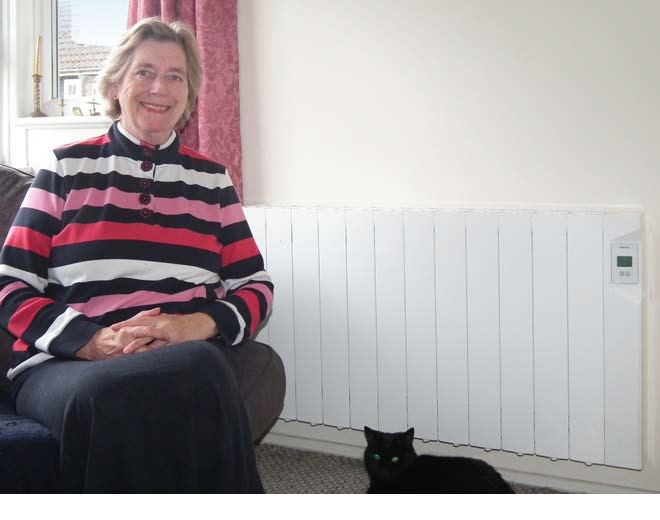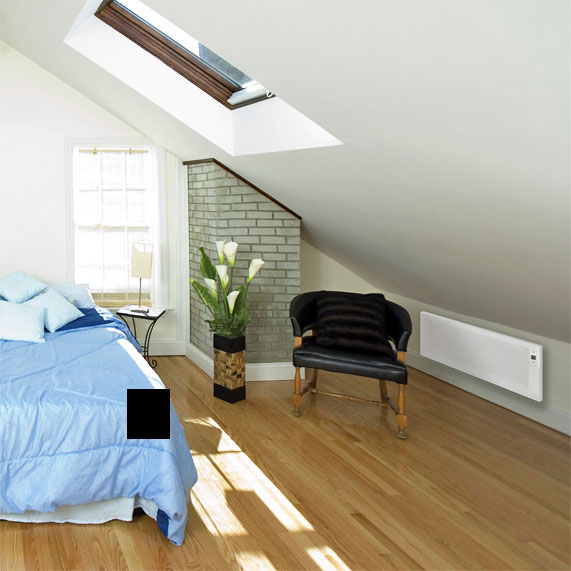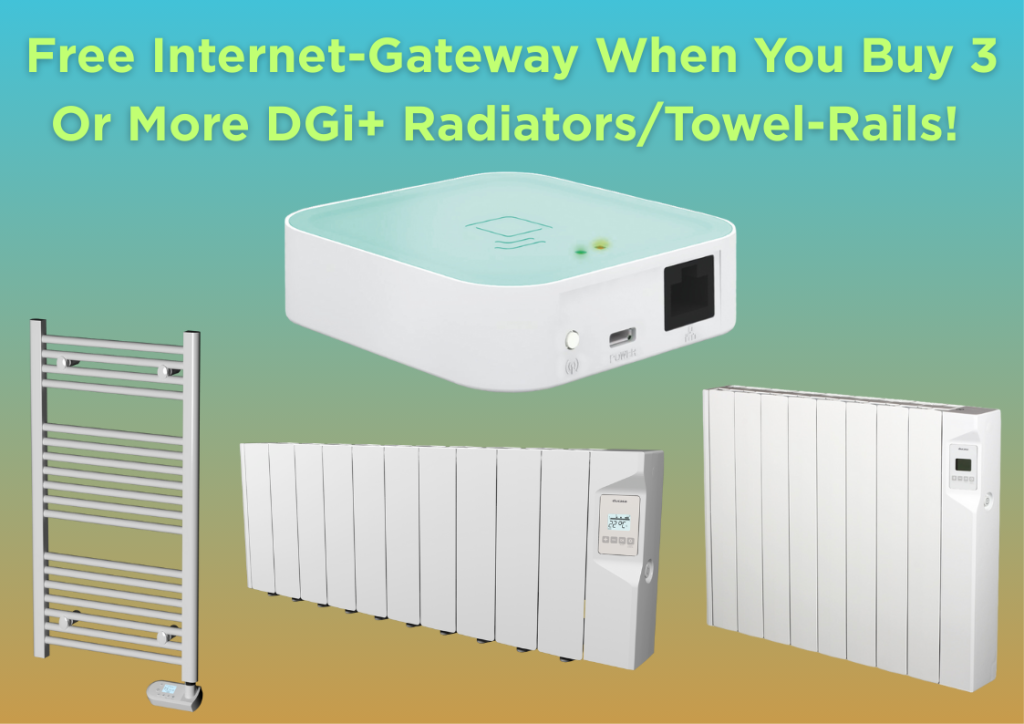
How Can You Save Money Heating Your Home?
We are asked this question on a daily basis, which is understandable considering the price of electricity is increasing. There is no single way to make heating our homes less expensive; it is often a combination of small things, which together make a big difference.
Of course using an efficient form of heating is important and a solution that is right for one property may not be right for another. With over 50 years’ experience heating homes and offices, at Ducasa we are pleased to offer assistance and advice.
Energy Saving Factors
All electric heaters convert 100% of electricity into heat, however there are many factors that influence economy including;
- Delivery of Heat
- Heat Up Times
- Accuracy of Thermostats
- Stability of Room Temperature
- Programming and Control
- Lifetime & Maintenance Costs
Delivery of Heat
Certain heaters, such as cheap freestanding oil filled radiators, are constructed using simple pressed steel panels which heat up, but don’t circulate the air around the room. If you are happy with a comfort temperature of say 21°C, the area around the heater is likely to be far hotter than the other areas of the room. This extra heat is unnecessary and is costs money.
Ducasa aluminium radiators are designed with this in mind, increasing the surface area of the radiator with a series of inner ‘heat’ fins, that warm a higher volume of air and encourages it to gently circulate into the room.
Heat Up Times
Sometimes we just need heat for a short period of time, for example when we want to eat our lunch in the conservatory. In this instance an electric radiator may take too long to heat up so a radiant panel heater such as the Ducasa Sunrise may be a better option.
Radiant heat is a form of Infra-red heating, but for added comfort we use a technically advanced, long wavelength electric element, which heats object directly and doesn’t glow. The heat is generated instantly and because the energy doesn’t need to heat air before it heats you, the results feel like the sun shining through the window.
Using a supplier such as Ducasa with a choice of electric heating products is essential to ensure you’re not just recommended a heater because that’s all they have.
Accuracy of Thermostats
Electric heater and electric radiators are fitted with either digital or mechanical thermostats. Digital thermostats like those in the Ducasa Avant range are accurate to 0.2°C, whereas mechanical thermostats can be accurate to around 2°C.
The accuracy of the thermostat can result in a room ‘overheating’ by several degrees. For example if you want your room to be 20°C and your thermostat is accurate to 3°C, the temperature will fluctuate between 20°C and 23°C. The additional 3°C is unnecessary and can increase your running costs considerably. If you use a digital thermostat the temperature can be virtually constant and therefore less expensive to run, which is ideal for your living rooms or bedrooms.
Stability of Room Temperature
As discussed in the previous chapter, overheating a room increases running costs and digital thermostats help avoid this, but the mass or weight of a heater and the heating element used also has an effect.
Ceramic or stone core heaters can take a long while to heat up, so when the thermostat senses the room temperature has dropped and switches the heating element on, the room temperature continues to drop until the stone core produces enough heat. When the room reaches the required temperature the stone core may have too much stored heat causing the room temperature to continue rising resulting in ‘overheat’.
For over five decades Ducasa has been researching and developing electric heating. During this time their technicians have produced the Avant range which has the perfect balance of aluminium, fast acting heat transfer fluid and highly responsive heating elements. Initially when the radiator is switched on and the room temperature is lower than the required temperature the radiator will become reassuringly hot, yet still within safe temperature guidelines required for CE approval. As soon as the room reaches temperature the thermostat and built in microprocessor will switch the element off and on in order to replace just heat lost from the room – the result is a consistently warm, comfortable radiator.
Programming and Control
Taking control of your heating can help save valuable energy and reduce running costs. Economy 7 storage heaters for example may use low cost electricity at night but the stored heat often escapes during the day leaving the home cold in the evening. Furthermore, you have to decide the night before if you need to charge your heaters that day.
It is far better to control the heating so your home is warm where and when you want it. With modern control systems such as the Avant DGi+ it is simple to programme your radiators to heat the rooms around your lifestlye. Each radiator can be controlled separately or programmed together to create heating zones.
Another big advantage of using on demand, direct acting electric heating is the reduced cost of peak time electricity. Although Economy 7 is cheap at night, maybe 6p or 7p a kWh, during the day it can be 17p or 18p a kWh – that compares to around 12p or 13p a kWh for a standard tariff. Remember, with Economy 7 everything in your home is charged at the peak rate during the day and evening, including your dishwasher, tumble dryer and electric cooker.
A simple 2-zone electric heating system is a great replacement for storage heaters and can be configured to offer all the functionality of a traditional ‘wet’ heating system without the need for a boiler or expensive servicing. Contact the team at Ducasa to find out more.
Lifetime Costs
When comparing the cost of heating systems it is important to consider the true lifetime costs. This includes the initial purchase / installation costs, the fuel costs and the maintenance costs.
Electric heating is normally the least expensive to install as it doesn’t need expensive pipework or a boiler; often the cost will be less than half of the alternatives with considerably less disruption to the home owner.
Where it is available, gas is still the cheapest fuel for heating our homes, so is often the best choice. There are exceptions to this, for example in flats where space and flues for gas boilers can cause issues. Oil can also be a cost effective fuel, although the price fluctuates considerably from summer to winter and requires a large outlay each time the tank is filled, something not all of us can afford. If oil is purchased in the winter it can be more expensive than electricity. Although electricity can be slightly more expensive than other fuels, competitive rates are available especially if the home owner is prepared to change suppliers on a regular basis.
Ducasa electric heaters are virtually maintenance free, just needing a wipe down from time to time, to keep them clean. This can save thousands of pounds over, for example a 25 year the lifetime of a gas or oil boiler system. Boilers need annual servicing and safety inspections which often includes replacing consumable parts such as fuel jets and pumps.
The high outlay for installation and ongoing maintenance costs associated with boiler systems outweigh the slightly higher fuel costs of electric options, which makes Ducasa radiators and panel heaters the perfect cost effective heating system for your home.
Summary
In summary it is important to choose the correct type of electric heating to use in your home – one size simply doesn’t fit all so use Ducasa who can offer choice. Taking control of your heating system is also vital to help reduce you energy bills; zoned heating, digital thermostats and the way the heat is delivered into the room is also important, again use Ducasa who have over 50 years’ experience.
The points mentioned above together with lower purchase, installation and maintenance costs means Ducasa electric heating is a cost effective option, providing warmth throughout the home without costing the earth to run.



